AI Assistants - digital helpers that have recently become indispensable across industries, streamlining workflows, enhancing productivity, and even assisting with complex problem-solving. In 2025, the capabilities and applications of AI assistants continue to expand, powered by advancements in Generative AI, Agentic AI, and large language models (LLMs).
Let’s understand the fundamentals of AI assistants and the technology that fuels their growing impact.
What Are AI Assistants?
AI Chat Assistants are intelligent, machine learning algorithms that can process tasks, recommendations, and user interactions in a natural language setting. They execute advanced algorithms with the ability to interpret user inputs, process related information, and generate meaningful output.
They could be voice-enabled devices like Amazon Alexa and Google Assistant, chat-based solutions built into platforms such as Microsoft Teams or Slack. What defines AI assistants, however, is their ability to extend beyond simple command execution, allowing them to grow into highly interactive tools that are capable of context understanding, learn from interactions, and adapt over time to preferences.
Examples of AI Chat Assistants
Consider a modern AI assistant like Rezolve.ai's Agentic SideKick. Unlike traditional assistants that merely respond to static queries, this assistant uses Generative AI to engage in nuanced conversations, assist with IT service management tasks, and even draft change management tickets. This demonstrates how AI assistants are shifting from reactive tools to proactive enablers.
The Technology Behind AI Assistants
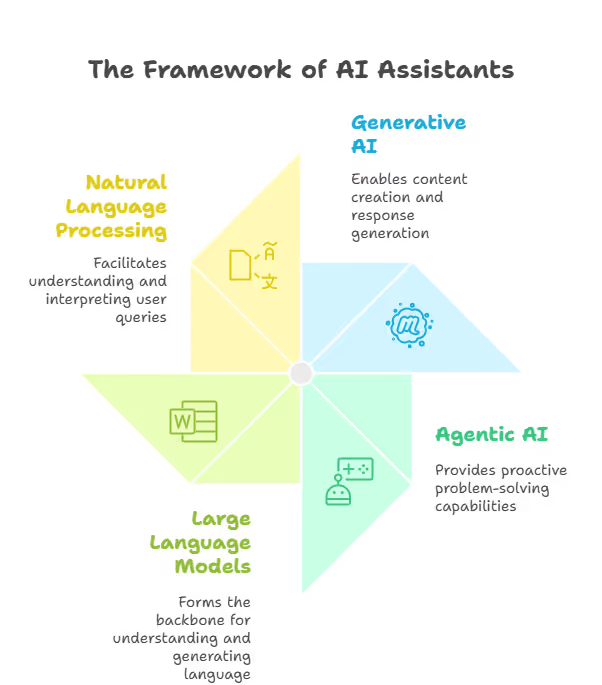
The power of AI assistants lies in the advanced technologies that enable them to operate seamlessly and intelligently. Here’s a breakdown of the key components:
1. Generative AI (GenAI): As a Creative Engine
Generative AI transformed the landscape of AI assistants. These tools now can generate content, draft responses, and create ideas based on what users provide them with. GenAI models, for example, use NLP in interpreting complex queries and creating responses that resemble humans.
For example, if an AI assistant like ChatGPT is asked to summarize a document or draft an email, it uses the training it received on vast amounts of data to generate coherent and appropriate outputs. This technology is being applied to business scenarios such as creating incident reports or summarizing the meeting notes.
2. Agentic AI: For Proactive Problem-Solving
Unlike Generative AI, Agentic AI offers some level of choice and proactivity. An Agentic AI-based assistant not only responds to the user input but also seeks patterns, infers needs in advance, and acts on those autonomously.
For example, an Agentic AI assistant in an IT service desk might autonomously identify recurring incidents, create problem tickets, and write solutions without a human. This kind of autonomy is vital in helping AI assistants become powerful business tools.
3. Large Language Models (LLMs): Operational Excellence
LLMs form the backbone of most modern AI assistants. Having been trained on large datasets, these models can understand context, analyze sentiment, and even give detailed answers to a variety of questions.
Popular examples of LLMs include OpenAI’s GPT-4, Google’s BERT, and Facebook’s LLaMA. What makes LLMs so powerful is their ability to generate accurate and contextually relevant responses, making AI assistants conversationally fluent and highly adaptive.
Real-World Application
An LLM-powered AI assistant in healthcare can help analyze patient data, suggest treatment plans, and even explain in simple terms the medical conditions. In customer service, these assistants can resolve common queries, escalate issues to human agents when necessary, and ensure a seamless user experience.
4. Natural Language Processing (NLP) and Understanding (NLU)
AI assistants rely heavily on NLP to understand user queries and NLU to understand their intent. Such technologies enable the assistants to interpret what is being said—be it text or voice commands—extract key details and come up with appropriate responses.
NLP allows AI assistants to understand the nuances of language, such as idioms, slang, or regional expressions, for accurate communication. For example, when a user asks, "Can you show me the latest sales data?" The assistant infers the intent behind the query and pulls up the relevant information.
Types of AI Assistants
Let’s explore the types of AI assistants available today and the unique roles they play.
1. Employee Support AI Chat Assistants
.avif)
Employee support AI assistants are designed to streamline workflows, resolve internal queries, and improve overall productivity within organizations. These assistants are often integrated with enterprise platforms like Microsoft Teams or Slack, making them accessible where employees already work. Here are some notable examples:
Rezolve.ai
Rezolve.ai stands out as a next-generation employee support assistant powered by multiple LLMs and RAG algorithm for redundancy. It natively integrates with Microsoft Teams, Slack and other legacy ticketing systems and automates tasks like automatic ticket resolution, enterprise search (knowledge management), and proactive incident management. Rezolve.ai’s Agentic SideKick 3.0 even drafts problems and change management tickets autonomously.
Rezolve.ai essentially enables conversational employee support 24/7. Its ability to deliver accurate support in-the-flow-of-work support makes it a game-changer for enterprises looking to turn their ITSM and HR ops from cost-center to measurable ROI.
Moveworks
Moveworks provides IT and HR support by leveraging Natural Language Understanding (NLU) to address employee queries in real time. It connects to internal systems like HRIS, ITSM, and CRM tools, allowing employees to get instant answers or trigger actions without leaving their workspace. For instance, Moveworks can reset passwords, update personal records, or escalate unresolved issues through an AI chat assistant.
Amelia
Amelia is a virtual agent of enterprise grade, an amalgamation of NLP with emotional intelligence. It was meant for more complex workflows, like onboarding employees or managing processes related to compliance. Amelia understands context and knows how to adapt in conversations; this makes it very good at improving employee satisfaction.
Kore.ai
Kore.ai offers a multi-faceted employee assistant platform that can be used for automating repetitive tasks, answering FAQs, and assisting with enterprise operations. It provides support for voice and chat, with seamless integration into tools like Microsoft 365 and Salesforce. Custom workflows can also be created, which makes Kore.ai the first choice for those organizations that have very unique operational requirements.
2. Customer Support AI Assistants
Customer support AI chat assistants aim to improve user experiences, address queries, and drive satisfaction. They are most commonly deployed on websites, messaging platforms, or social media channels to ensure they are available 24/7. Let's review some well-known examples.
Intercom
The Intercom AI assistant focuses on proactively engaging customers with personalized messages, automated responses, and lead qualification. Its forte is deciphering customer intent and routing them to the right resource—be that an article from the knowledge base or even a live agent.
Tidio
Tidio is an AI-enabled chatbot tailor-made for small and medium enterprises. It brings real-time customer support, automates common queries, and can be seamlessly integrated with e-commerce platforms such as Shopify and WooCommerce. Its multilingual capabilities make it ideal for businesses with a global customer base.
HubSpot
The assistant integrates natively with the HubSpot CRM platform, enabling sales and customer support teams to move more efficiently and effectively. Automating repetitive tasks, scheduling meetings, and updating customer information are some of its major features in a chat and allow teams to focus on higher-value interactions.
Ada
Ada focuses on making highly customizable customer support bots for an enterprise. Using AI, it analyzes customer interactions in order to deliver experiences tailored to them. It strongly emphasizes automation and helps businesses reduce support costs while improving customer satisfaction.
Customerly
Customerly combines live chat, a chatbot, and customer survey features into an all-inclusive support solution. Its AI assistant auto-responds to common queries but seamlessly transfers complex issues to human agents. Customerly even integrates with marketing tools so that support and upselling can be done simultaneously.
3. Personal AI Assistants
Personal AI assistants cater to individual users, helping them manage day-to-day tasks, stay organized, and access information quickly. Here are three well-known examples:
Siri
Apple’s Siri was one of the first widely adopted personal AI assistants. Integrated into iOS devices, Siri allows users to perform tasks like sending messages, setting reminders, or searching the web using voice commands. Over the years, it has grown smarter, leveraging machine learning to understand user preferences and improve accuracy.
Alexa
Amazon’s Alexa has become a household name in voice-controlled assistants. It powers smart devices like the Amazon Echo, enabling users to control their home environment, stream music, set alarms, and even order groceries with voice commands. Alexa’s vast library of third-party skills extends its capabilities far beyond basic tasks.
Google Assistant
Google Assistant combines robust search capabilities with practical tools to help users with tasks ranging from scheduling to navigation. Integrated into Android devices and Google Home, it offers seamless access to Google services like Maps, Calendar, and Gmail, making it a reliable everyday companion.
4. Specialized AI Assistants
Specialized AI assistants are designed for niche tasks, offering expertise in areas like travel planning, scheduling, or financial management.
Delta Travel Assistant
Delta Airlines’ AI-powered travel assistant exemplifies how specialized assistants can improve customer experiences. The Delta assistant provides real-time updates on flight status, gate changes, and baggage tracking. It also offers travel recommendations, helping customers find the best routes and accommodations. By focusing on a specific domain, Delta’s assistant delivers exceptional value to frequent travelers.
5. Multipurpose AI Platforms
Multipurpose platforms are the hybrid solutions that incorporate AI assistant capabilities with other tools, which in turn make them versatile and scalable for a large number of applications.
Microsoft Copilot
Microsoft's Copilot integrates with tools like Word, Excel, and Teams, transforming them into productivity powerhouses. It helps with drafting documents, analyzing data, and managing projects, all while learning from user input to provide tailored suggestions. A multipurpose assistant, Copilot closes the gap between individual productivity and enterprise efficiency.
IBM WatsonX
IBM WatsonX takes AI assistance to the next level, bringing conversational AI together with leading analytics and machine-learning capabilities. It allows businesses to build custom AI models tailored to their needs—be it for customer service, optimization of the supply chain, or fraud detection. WatsonX can scale and adapt to such diverse use cases, hence becoming one of the favorites among large enterprises.
Chatbots vs. Conversational AI vs. AI Assistants: Understanding the Key Differences
As organizations evaluate automation technologies, it's important to understand the distinctions between different solutions that are often incorrectly used interchangeably.
Evolution of Support Automation: A Comparison
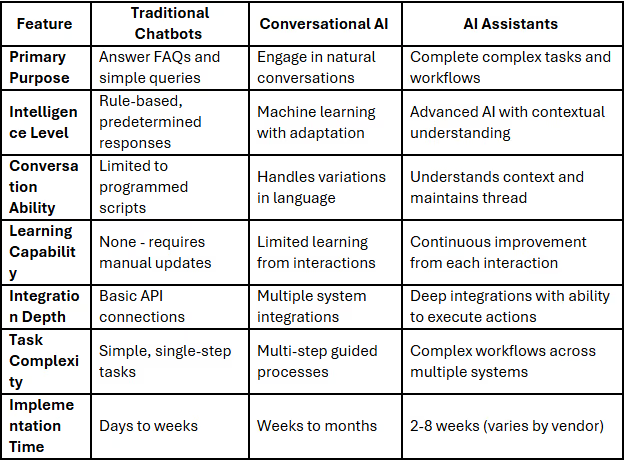
Legacy Systems vs. Modern AI Assistants: Real-World Impact
To understand the transformative potential of AI assistants, here's how they compare with legacy support systems across key business metrics:
IT Support Comparison
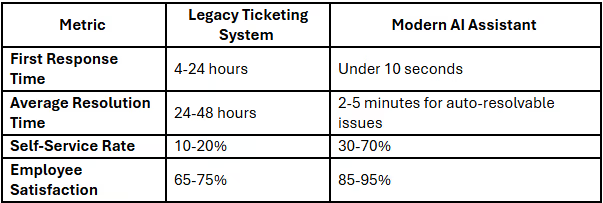
Case Study: NYC Department of Buildings (NYC-DOB)
The New York City Department of Buildings implemented Rezolve.ai's AI assistant to enhance employee support during the COVID-19 pandemic. Their requirements included:
- Providing 24/7/365 Human Resources support to employees during remote work
- Managing roll-call information for in-office, on-field, and teleworking employees
- Issuing building passes and tracking attendance
- Managing vaccination proof and COVID test results
Within just 4 weeks of implementation, NYC-DOB achieved:
- Automated Level 1 support for COVID-19 and regular HR issues
- Reduced HR support team workload through automation of repetitive tasks
- Streamlined attendance tracking for ~2,000 employees
- Simplified compliance verification for COVID-19 protocols
- Enhanced reporting and analytics for workforce management
This real-world application demonstrates how AI assistants can transform manual, time-consuming processes into efficient, automated workflows while improving the employee experience.
The Role of AI Assistants in Different Industries
.avif)
AI assistants are transforming industries by providing personalized, efficient, and scalable solutions. Whether it’s streamlining workflows, enhancing user experiences, or enabling better decision-making, their impact is profound. Let’s see their applications across different verticals.
Higher Education
In higher education, AI assistants are becoming indispensable for both students and faculty.
- Student Support: AI assistants provide 24/7 support for common queries like course schedules, campus facilities, and academic resources. For instance, a chatbot can guide students to the right department or resource within minutes, reducing the need for staff intervention.
- Enrollment Support: These assistants simplify the enrollment process by answering FAQs about admissions, tuition, and deadlines. They also assist in application tracking, ensuring prospective students stay informed at every stage.
- New Student Onboarding: AI-driven tools streamline onboarding by providing interactive campus tours, course registration assistance, and guidance on housing options.
- Faculty Support: Faculty members benefit from AI assistants that handle administrative tasks like scheduling meetings, organizing class materials, or even grading assignments, freeing them to focus on teaching and research.
Public Sector
Governments worldwide are embracing AI assistants to provide efficient resident support, particularly in an era of leaner governance.
- Resident Support: AI assistants serve as digital touchpoints for citizens, answering queries about public services, filing complaints, and providing updates on applications.
- Example: In smaller municipalities, AI chatbots assist residents in renewing permits, reporting infrastructure issues, and accessing emergency services, reducing the workload on government employees.
In today’s climate of smaller governments, these assistants bridge the gap between reduced resources and increasing citizen demands, ensuring essential services remain accessible and efficient.
Banking
AI assistants are redefining customer experiences in the banking sector by providing personalized, secure, and on-demand services.
- Example: Wells Fargo’s Fargo support bot is a prime example. It helps customers check account balances, track spending, and even manage savings goals. Fargo also uses predictive analytics to alert customers about potential overdrafts or unusual account activity, making banking more transparent and user-friendly.
Healthcare
AI assistants are playing a pivotal role in transforming healthcare delivery, addressing challenges like staffing shortages, rising costs, and patient engagement.
- Virtual Health Assistants: These tools provide 24/7 support for patients, helping them schedule appointments, access medical records, and understand treatment plans.
- Example: Babylon Health’s AI assistant guides users through symptom checkers, offering possible diagnoses and next steps, including scheduling a consultation with a doctor.
- Provider Support: For healthcare professionals, AI assistants streamline administrative tasks like appointment reminders, billing, and patient follow-ups, enabling them to focus on patient care.
Rezolve.ai vs. Other AI Assistants: The Agentic Advantage
When evaluating AI assistants for enterprise deployment, Rezolve.ai stands apart through several distinctive advantages based on its GenAI-native architecture and agentic capabilities.
Key Differentiators of Rezolve.ai
1. Unified Employee Service Platform
Unlike most competitors that focus solely on IT or HR support, Rezolve.ai provides a unified platform that combines:
- IT Service Management (ITSM) with full ITIL workflows
- HR Service Desk with case management and knowledge delivery
- Enterprise Automation with no-code workflow capabilities
This approach eliminates silos between departments and provides employees with a single point of contact for all support needs.
2. Agentic AI: Beyond Conversation to Action
Rezolve.ai's Agentic Sidekick 3.0 doesn't just respond to questions—it takes autonomous action:
- Autonomously resolves 30-70% of IT tickets
- Executes HR transactions like PTO requests and address changes
- Performs desktop automation for software installation and troubleshooting
- Creates and manages tickets without human intervention
This agentic capability moves beyond the "suggestion" model of most AI assistants to deliver actual resolution.
3. Native Microsoft Teams and Slack Integration
Rezolve.ai meets employees where they already work by providing native integration with collaboration platforms:
- No new portals or interfaces to learn
- Seamless authentication through existing identity systems
- Rich interactive capabilities within the familiar chat interface
4. Enterprise-Grade Security and Compliance
For organizations with strict security requirements, Rezolve.ai offers:
- SOC 2 Type II, ISO 27001, HIPAA, and GDPR certifications
- End-to-end encryption and role-based access
- Built-in DLP capabilities that block PII or sensitive information
- Explainable AI with source-traceable answers
Real-World Results
Rezolve.ai's approach delivers measurable business impact:

Case Study: ACTRANSIT
ACTRANSIT implemented Rezolve.ai to enhance frontline support for their operations. By providing an AI assistant through Microsoft Teams, they were able to deliver immediate support to field staff, automate common requests, and significantly reduce the burden on their support team. The solution's ability to integrate with their existing systems and provide 24/7 support proved especially valuable for their distributed workforce.
By combining advanced AI capabilities with enterprise-ready features and proven implementation methodologies, Rezolve.ai transforms employee support from a cost center to a strategic advantage—delivering measurable ROI while dramatically improving the employee experience.
The Future of AI Chat Assistants
The evolution of AI assistants is far from over. Emerging trends suggest that these tools will become even more integrated, intelligent, and intuitive, particularly in the following areas:
Voice-Driven Interactions
Voice-enabled AI assistants are becoming increasingly common, providing hands-free, conversational support across industries. As speech recognition technology advances, these assistants will become better at understanding natural language, accents, and contextual nuances, making voice the preferred medium for many users.
More Agentic AI with Business Logic
Future AI assistants will incorporate deeper business logic, enabling them to make autonomous decisions that align with organizational goals. These bots won’t just execute tasks but will also evaluate scenarios, weigh options, and select the best course of action. For instance, an AI assistant in a retail setting that automatically identifies slow-moving inventory and triggers discount campaigns without requiring human intervention.
Closing Note
AI assistants are no longer just tools—they’re partners in productivity, transforming industries with their adaptability and intelligence. Whether improving student onboarding, aiding residents in small towns, or streamlining patient care, these assistants are defining the future of work and service. And with advancements in voice capabilities and agentic decision-making, their applications are just beginning to unleash the real magic for businesses.
Straightforward and game-changing—AI assistants are the future of enterprise operations.
Frequently Asked Questions About AI Assistants
How do AI assistants differ from chatbots?
AI assistants represent a significant evolution beyond traditional chatbots. While chatbots operate on predefined rules and scripted responses, AI assistants leverage advanced technologies like LLMs to understand context, learn from interactions, and handle complex queries. The practical difference is that chatbots are limited to simple, predictable interactions, while AI assistants can manage sophisticated workflows and adapt to user needs.
How is an AI assistant used in employee service desks?
AI assistants automate ticketing, answer FAQs, guide employees, and integrate with tools like MS Teams to resolve issues without human intervention.
What technology powers modern AI assistants?
Modern AI assistants are powered by several key technologies:
- Large Language Models (LLMs) that enable natural language understanding and generation
- Retrieval Augmented Generation (RAG) that enhances responses with information from knowledge bases
- Agentic AI Frameworks that enable autonomous decision-making and actions
- Natural Language Processing (NLP) for understanding language nuances
- Machine Learning systems that improve performance over time
How are AI assistants transforming enterprise operations?
AI assistants are fundamentally changing enterprise operations by:
- Shifting from ticket management to immediate issue resolution
- Breaking down knowledge silos across departments
- Enabling 24/7 support without additional staffing costs
- Dramatically improving employee experience and productivity
- Reducing operational costs while improving service quality
What should organizations consider when implementing an AI assistant?
Key considerations include:
- Integration capabilities with existing systems
- Security and compliance requirements
- Knowledge management infrastructure
- User experience and adoption strategy
- Implementation timeline and resource requirements
- Success metrics and ROI measurement


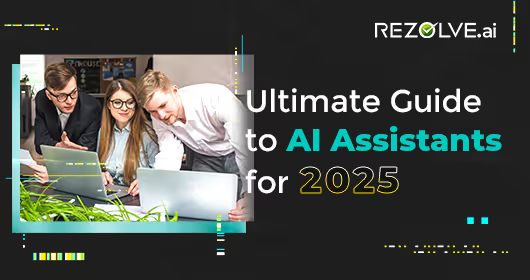



.webp)

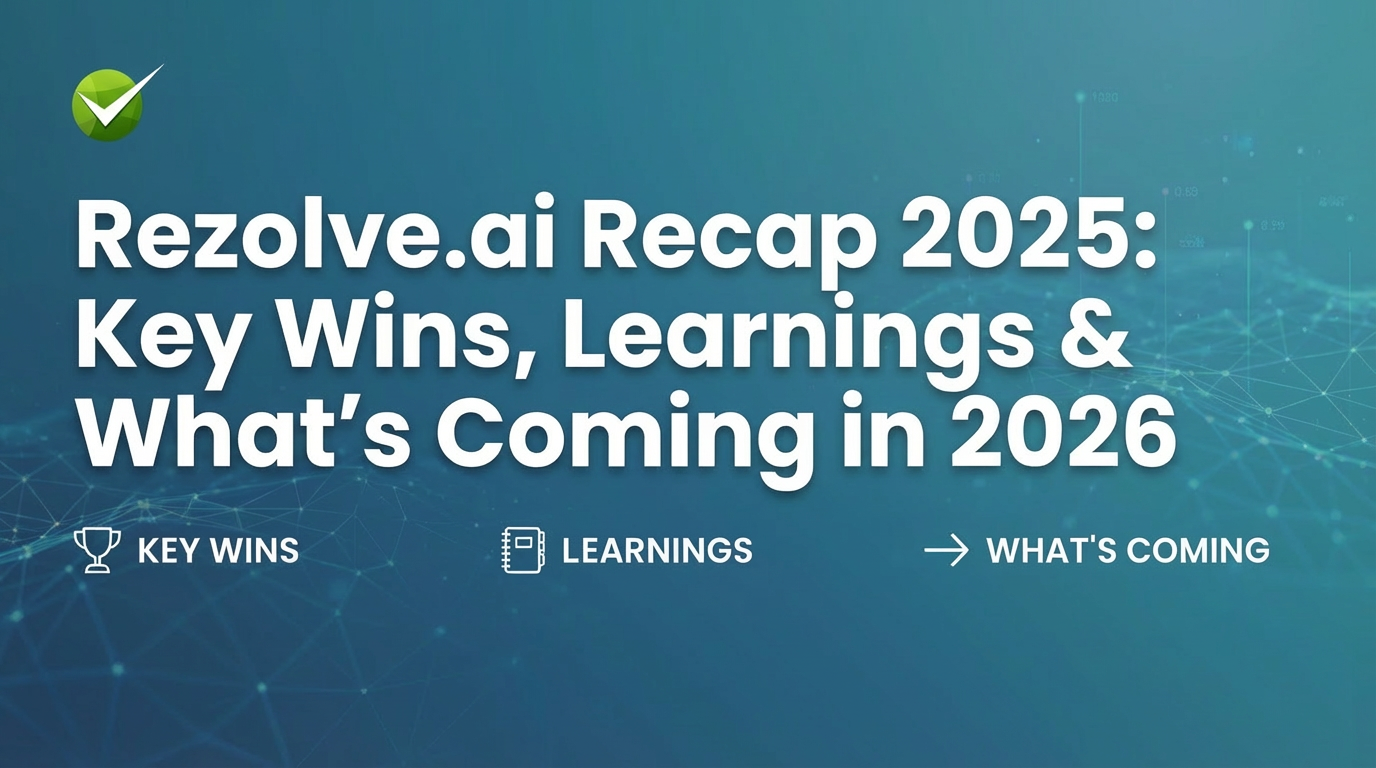


.jpg)

.png)








.png)